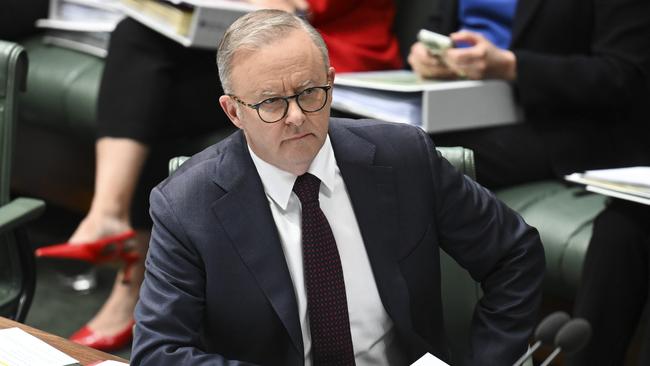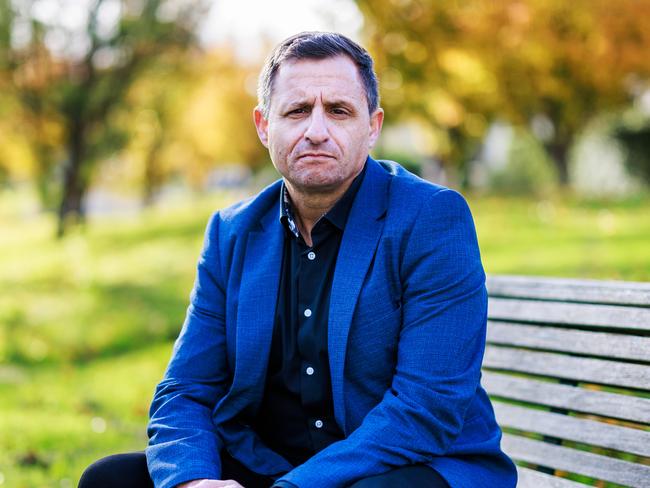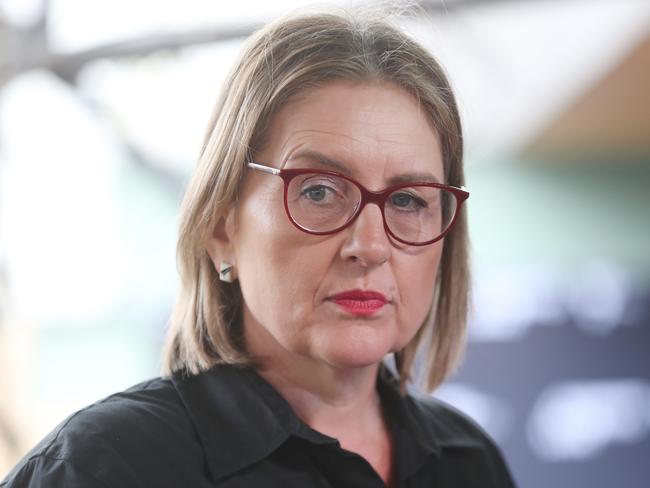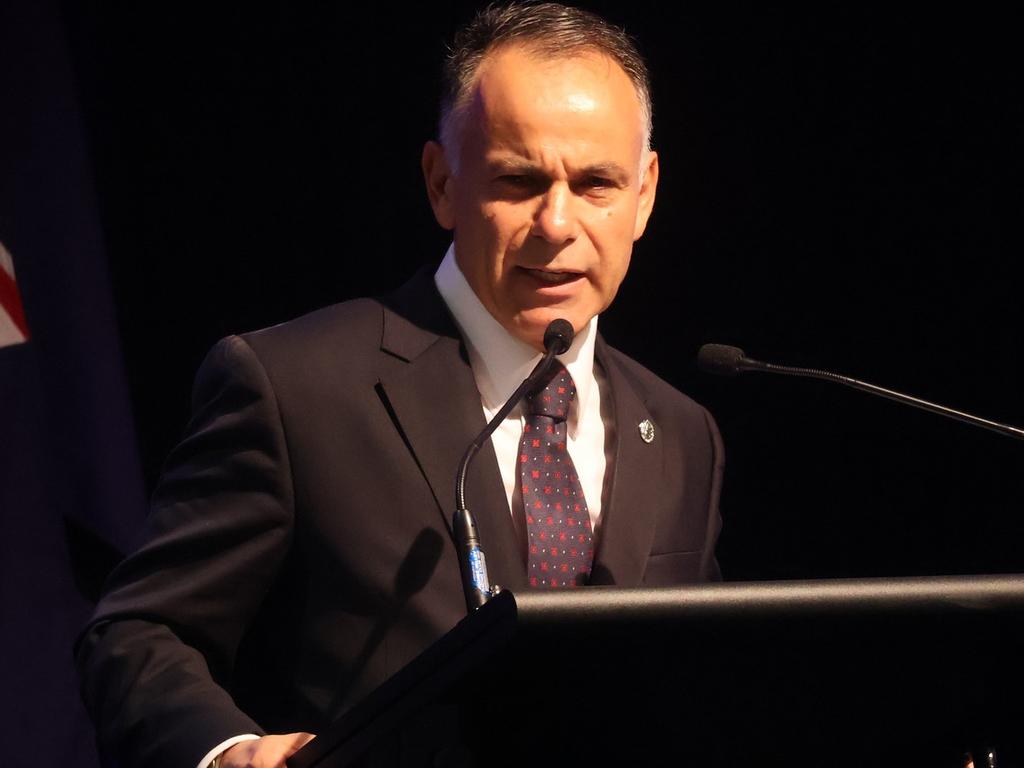Labor’s red-hot run in doubt as state voters’ wallets empty
Labor has been dominant in Victoria for so long that few are prepared to declare it is running out of political gas. But that’s changing – and it could have significant impact on the federal election.

Labor has been dominant in Victoria for so long that few are prepared to declare it is running out of political gas.
That is changing. For RedBridge political strategist Kos Samaras, a former long-term ALP campaigner, time and changing demographics have signalled the beginning of the end of a dominant run that has given Anthony Albanese nearly a third of all his seats in the federal parliament and the party command of state politics.

This shift in sentiment and demographics has the potential to have a significant impact on the looming federal election, coming as the Allan government is drowning politically amid a smashed budget and a vacuum left by Daniel Andrews’ crash-through-or-crash politics that delivered thumping majorities against the odds.
Samaras cautions that this historically significant Labor dominance – often referred to by its own as the golden era – is under threat in Australia’s most progressive state.
“I think it’s gone,” he says. “They are entering into a new paradigm.”
It’s a paradigm that also continues to threaten the Liberal Party, which holds only two federal seats inside Melbourne’s electoral boundaries – and both of these are on knife-edge margins. It is possible that Labor sheds votes at the poll but the Liberals go backwards as well, as the cost-of-living backlash merges with the issue of young voters peeling off the major parties, as Samaras has argued.
In Victoria Albanese has the most numbers at stake, given that after the redistribution he holds 25 seats and needs the state to remain red. For a conjunction of reasons there are as many as six Labor federal seats in play or at risk at the next election in Victoria compared with the Liberal Party’s two.
Victoria could have a rare say in the election result but the landscape is complicated. Two of those potentially stressed Labor seats – Aston and Dunkley – were won in by-elections and are vulnerable to cost-of-living pressures, populated as they are by struggling voters and older, more established people. Dunkley is safer than Aston.
The remaining four vulnerable seats include the perennially in-play interface seat of McEwen. Then there are three wildcards that underpin the uncertainty of a changing world, where younger voters skew left but are not rusted on to the major parties.
Wills, once held by former Labor prime minister Bob Hawke, is facing a dual threat of cost of living and progressive issues such as the Gaza war, with the Greens certain to threaten again after securing 28.3 per cent of the primary vote under the old boundaries in 2022. ABC election analyst Antony Green has the seat at 5.2 per cent Labor versus the Greens.
After the redistribution, which is still being finalised, Wills’ borders spill deep into progressive voting land in inner-city Carlton and Fitzroy, with only four lower socio-economic suburbs where cost of living will dominate. It is ideological tiger country for Labor.
Macnamara, an inner-city progressive seat, seems always to be in play but has the added dimension of the Middle East being on fire, as seat holds a significant number of Jewish voters. This should challenge the Greens and help the Liberals, given the hardline anti-Israel stance by the minor party.
But like Wills and other inner and middle-suburban seats, there are big pockets of progressive voters in Macnamara. These areas can skew the top five issues of concern to traditional Labor backers: cost of living, housing, health, economy and climate change.
After the 2022 federal election Victoria was an inland sea of red, most obviously in Melbourne’s north and west. Any commentary on Labor and Victoria needs to acknowledge this, just as it needs to acknowledge the thumping majorities delivered by the Andrews government. This is democracy at work. But for reasons of state government failures and cost-of-living pressures, the once rock-solid federal Labor seats across that sweep of Melbourne are less safe.
Hawke, held by right-wing numbers man Sam Rae, is in play, according to senior Labor sources.
The seat pushes out into the far reaches of Melbourne’s northwest where a low-cost housing boom has failed to be matched by adequate infrastructure in the more densely populated communities. It’s not a problem isolated to Hawke but voters often must queue in cars, sometimes for hours on end, while making the commute into the city – a common theme in outer northern and western seats.
On the other side of town, the redistribution has killed off Higgins and has rendered the Liberal seats of Deakin and Menzies ultra-marginal and imperilled – at least statistically. This is a threat to two of the best performers in Peter Dutton’s opposition, Michael Sukkar and Keith Wolahan. Both would be candidates for cabinet if Dutton secured an unlikely but not impossible win and regained government for the Coalition. Deakin and Menzies are the two urban Melbourne seats held by the Liberals as defined by the electoral commission.
La Trobe and Casey are basically semi-rural but cling to a couple of outer suburban patches.
Lose any more Liberal seats and the party’s capacity to function in Victoria is even more difficult as seats such as Wannon in the state’s southwest and west – once held by Liberal prime minister Malcolm Fraser – face the challenges of regional urbanisation.
The short story is that Labor is under most immediate pressure in Victoria but the Liberal Party has already been blasted into a crater.
Monash University emeritus professor of politics Paul Strangio says it is wide open to question what impact the federal Opposition Leader’s style of politics will have in Melbourne, where most of the votes are. “It is possible the Liberals could be banished from Melbourne next year,” Strangio says. He describes Dutton’s agenda as appearing to lean towards right-wing populism, which will not help the party pick up teal seats such as Kooyong, being contested by Amelia Hamer, a relative of former premier Sir Rupert “Dick” Hamer.
“He’s making it more difficult every day,” Strangio says.
He says, for Labor, Wills will be a serious challenge after the redistribution and there was evidence in the 2022 election of large drops in the primary vote in safe Labor seats including Scullin, Gorton, Holt and Calwell. “These seats feel neglected,” Strangio says. Another potential weak point for the Liberal Party is the performance of its state opposition, which is seen as “such an underperforming group”.
The extent to which state issues bleed into federal voting intentions can be hard to gauge. In 1990, Labor was smashed federally on the back of the budget and economic crisis in Victoria during the Cain-Kirner years. This year Victoria has the budget crisis but not yet the soup kitchen economic crisis that led to double-digit unemployment and interest rates and marching in the streets under Cain-Kirner.
Federal Labor also has the benefits in key areas of state Labor largesse, which has pumped billions into some federal seats and fuelled the Albanese government vote in Aston and Dunkley.
The problem for the Prime Minister is that the state Labor budgetary dysfunction appears to be bleeding into the polls, with incumbent Premier Jacinta Allan slipping in two published surveys to the point that there is open questioning about whether her government can survive in just more than two years.

It doesn’t help when its addiction to higher taxes and its clumsy handling of health funding create a perception of economic doom. The Allan government is seeking extra revenue or savings to make up for a $1.5bn emergency hospital funding bailout and looks fiscally hopeless.
“The treasurer of the state does get a little bit unhappy when I’m presented with short payments in budget management,” Treasurer Tim Pallas said this week. “But I do make a point to the health minister and to others, we really do (need to) return to the level of fiscal responsibility and attention to financial obligations that was pretty much part and parcel of the pre-Covid era.”
What does this have to do with Canberra? “It’s definitely having an effect on us,’’ a senior federal Labor MP says. “The (state) government is starting to smell. People are talking about it.”
While cost of living is key, federal Liberal MPs are alarmed about the looming defamation case between state leader John Pesutto and expelled Independent Liberal Moira Deeming. If the case (and the political vibe) goes against Pesutto, he almost certainly will lose the leadership, just when the federal party will be winding up for a summer-spring election. Senior Liberals are even more concerned that the defamation judgment could spill over to late this year or early next year, hanging over the party in the way the brawl over gender issues hung over the Aston by-election. (Although state MPs downplay how much the Deeming matter cruelled the federal Libs.)
“The federal election will be about cost of living, first, second and third,’’ a federal MP says.
“We just don’t want the state MPs to wreck it for us. We don’t want any distractions, we want to be given a clean run at Labor. No interference. None.’’
Labor believes Dutton is its best hope of appealing to members of its base considering peeling off to other parties or independents. Expect a lot of Dutton-as-the-devil posters to counter the fear that Labor’s golden run in Victoria is about to end.







To join the conversation, please log in. Don't have an account? Register
Join the conversation, you are commenting as Logout